Anna Czekanowicz
Between 1978 and 1990, Anna Czekanowicz was the literary director of the Baltic State Opera and Philharmonic. In 1990, she took part in the International Writing Program at Iowa University. She then served as deputy director of the Baltic State Opera (1994–2007). In 2002–2005, she chaired the Gdańsk branch of the Polish Writers’ Association. Between 2007 and 2016, she served as Director of the Mayor’s Office for Cultural Affairs at the Gdańsk City Hall. In 2016–2019 she advised Mayor of Gdańsk Paweł Adamowicz on cultural matters. Czekanowicz is a member of the Gdańsk Board for Culture (2019–2023) and Polish PENClub. She devised the European Poet of Freedom festival and award.
Poetry volumes: Ktoś, kogo nie ma (1976), Więzienie jest tylko we mnie (1978), Pełni róż obłędu (co-written with Zbigniew Joachimiak; 1983), Najszczersze kłamstwo (1986), Śmierć w powietrzu (1991), Wciąż widzę twarze (1994).
Her texts have appeared in Punkt, Tytuł and other journals. She also writes short stories that have been published, among others, in the 2nd volume of the Transgresje (Odmieńcy) anthology of contemporary culture edited by Maria Janion and Zbigniew Majchrowski.
 Krzysztof Czyżewski (Chairman of the Jury)
Krzysztof Czyżewski (Chairman of the Jury)
Born in 1958. Idea practitioner, essayist and initiator of intercultural events. Graduate in Polish Literature at Adam Mickiewicz University in Poznań.
Author of “Scieżka pogranicza” (“The Borderland Path,” 2001), “Linia powrotu. Zapiski z pogranicza” (“The Returning Line. Borderland Notes,” 2008), “Miłosz. Tkanka łączna” (“Miłosz. Connective Tissue,” 2014). Co-author and editor of “Podręcznik dialogu. Zaufanie i tożsamość” (English edition: “Trust and Identity. A Handbook of Dialogue,” 2011; Polish edition 2012), “Miłosz – Dialog – Pogranicze” (“Miłosz – Dialogue – Borderland,” 2012) and “Podlasie. Pamięć – Tożsamość – Rozwój” (“Podlasie. Memory – Identity – Development,” 2014).
Founder of the Borderland Foundation and the Borderland of Arts, Cultures and Nations Centre in Sejny; editor-in-chief of “Krasnogruda” magazine and chief executive of Borderland Publishing House. Lecturer at the University of Warsaw, Vilnius University, New School University (New York), Transregional Centre for Democratic Studies (Cracow), Salzburg Seminar, Institute of Humanities and Social Sciences at the Ivan Franko National University of Lviv, Boston University. Honorary ambassador of Podlaskie Voivodeship. Currently he is working on establishing the Pedagogical Province of Bridge Builders in Krasnogruda at the Polish-Lithuanian border.
Recipient of the Saint George Order awarded by Tygodnik Powszechny, the A. Gieysztor Prize, the J. Giedroyć Award, the New Culture of New Europe Award of the Economic Forum in Krynica.
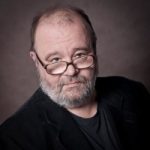 Paweł Huelle
Paweł Huelle
photo: Joanna Siercha
Born in 1957. Prose writer and poet, playwright and screenwriter, essayist and columnist, editor and academic. Graduate in Polish Philology at Gdańsk University.
Author of “Weiser Dawidek” (1987; English edition “Who was David Weiser?,” 1991), “Opowiadania na czas przeprowadzki” (1991; English edition “Moving House and Other Stories,” 1994), “Wiersze” (“Poems,” 1994), “Pierwsza miłość i inne opowiadania” (“First Love and Other Stories,” 1996), “Mercedes-Benz. Z listów do Hrabala” (2001; English edition “Mercedes Benz,” 2005), “Hans Castorp w Sopocie. Zaginiony rozdział z Czarodziejskiej Góry” (2002; English edition “Castorp” 2007), “Byłem samotny i szczęśliwy” (“I Was Lonely and Happy,” 2002), “Ostatnia Wieczerza” (2007; English edition “The Last Supper,” 2008).
Recipient of Polityka’s Passport (2001). In 2008 nominated for the Nike Literary Award. Awarded The Order of Polonia Restituta by President Bronisław Komorowski in 2012.
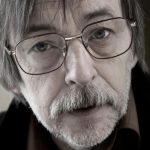 Zbigniew Mikołejko
Zbigniew Mikołejko
Born in 1951. Philosopher of religion, essayist, lecturer.
Author of over 800 works translated into multiple languages: “Katolicka filozofia kultury w Polsce w epoce modernizmu” (“Catholic Philosophy of Culture in Modernist Poland,” 1987), “Kim jestem dla ciebie…” anthology (“Who Am I for You,” 1987), “Elementy filozofii” (“Elements of Philosophy,” seven editions 1998-2008), “Mity tradycjonalizmu integralnego” (“Myths of Integrative Traditionalism,” 1998), “Emaus oraz inne spojrzenia do wnętrza Pisma” (“Emaus and Other Views into the Scripture,” 1998), “Żywoty świętych poprawione” (“Lives of the Saints – Revised,” 2001; The Warsaw Literary Premiere Award, June 2001; second edition 2004; edition for the hearing impaired 2002), “Sytuacja ostateczna w perspektywie słowa” (“Death and Text. Final Situation in the Verbal Context,” 2001), “W świecie wszechmogącym. O przemocy, śmierci i Bogu” (“In the World Almighty. On Violence, Death and God,” 2009). Author of forewords and afterwords to works of distinguished teologists, philosophers and historians: Dalai Lama, Karen Armstrong, Eugene Drewermann, Hans Küng, Jacques Le Goff, Margaret Starbird. Essayist publishing with „Borussia,” „Dialog,” „Etyka,” „Konteksty,” „Literatura na Świecie,” „Nowe Książki,” „Przegląd Filozoficzny,” „La Sicilia,” „Społeczeństwo Otwarte,” „Twórczość,” „Tygodnik Powszechny,” „Uncaptive Minds.”
Director and professor of the Religion Research Institute in the Institute of Philosophy and Sociology at the Polish Academy of Sciences in Warsaw. Fellow member of the American Academy in Rome (1996), professor at the Warsaw University of Humanities.
Asked about faith, he says: “I never have certainty. When nonbelievers convince me not to believe, I go towards the believers. When believers convince me to believe, I run towards the believers. The worst thing is the violence of discourse, one or another. Nonfaith is also a kind of faith – faith that God does not exist, that God is not important to us.” (Gazeta Wyborcza)
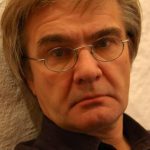 Stanisław Rosiek
Stanisław Rosiek
Born in 1953. Literary historian, essayist, editor.
Author of “Zwłoki Mickiewicza. Próba nekrografii poety” (“Mickiewicz’s Corpse. Attempt at the Poet’s Necrography,” 1997), “[nienapisane]” (“[unwritten],” 2008), “Władza słowa : szkice, notatki, świadectwa” (“The Power of Words: Essays, Notes, Testimonies,” 2011). Co-author of “Słownik schulzowski” (with Włodzimierz Bolecki and Jerzy Jastrzębski, “Schultzian Dictionary,” 2004), three volumes of “Transgresje” series: “Galernicy wrażliwości,” “Osoby,” “Maski” (with Maria Janion, “Transgressions” – “Galley-Slaves of Sensitivity” 1981, “Persons” 1984, “Masks” 1986).
Lecturer at the Polish Philology Institute at Gdańsk University.
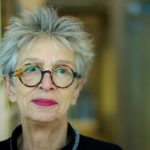 Anda Rottenberg
Anda Rottenberg
photo: Aleksander Pawlikowski
Born in 1944. Art historian and critic, writer, art curator.
Author of “De Kooning i Rauschenberg – podwójność niesymetryczna” (“De Kooning and Rauschenberg: Asymmetric Duplicity,” 1984), “Proszę bardzo” (“There You Go,” 2009),
“Przeciąg: teksty o sztuce polskiej lat 80.” (“Draught: Essays on Polish Art in the 80s,” 2009), “Sztuka w Polsce 1945–2005” (“Art in Poland 1945-2005,” 2005).
Member of the International Association of Art Critics, curator of multiple domestic and international exhibitions in renowned art galleries and at international art events.
Recipient of Commander’s Cross of the Order of Polonia Restituta.
About the art she promotes, she says: “I take on things that exceed the imagination of many people who are not prepared to experience contemporary art. I was and still am interested in the problems raised by unconventional artists who go beyond socially recognized canons – and this always raises objections at first, only then does it become popular and enter the textbooks.” (Elle)
 Beata Stasińska
Beata Stasińska
Photo: Filip Miller
Publisher, editor, co-founder and for years editor-in-chief of the W.A.B. publishing house. Graduate from Polish Philology Department at the University of Warsaw, with which she is now associated – she is a lecturer at the Postgraduate Publishing Studies at the University of Warsaw.
Awarded the National Order of Merit by the French government and the Cultural Activist badge. Winner of the Creator of Culture title (2002), recipient of the Gloria Artis Medal of Merit for Culture (2008). Member of the Programme Council of the Women’s Congress, the informal social movement called Citizens of Culture of the Polish PEN-Club and the Media Fund Council.
About her work, she says: “The publisher (…) falls in love with other people’s talents, there is no room for narcissism here. There is a kind of idealism or even naivety in this work, thanks to which impossible things become possible. You have to like people who write, respect them for their talent, because it’s a rare gift.” (Elle)
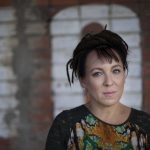 Olga Tokarczuk
Olga Tokarczuk
photo: Krzysztof Dubiel for Instytut Książki
Born in 1962. Novelist, essayist, poet, screenwriter. Graduate in Psychology at the University of Warsaw.
Author of “Podróż ludzi Księgi” (“The Journey of the Book People,” 1993), “E.E.” (1995), “Prawiek i inne czasy” (1996; ”Primeval and Other Times,” English edition 2010), “Dom dzienny, dom nocny” (1998, “House of Day, House of Night,” English edition 2002), „Ostatnie historie” (“The Last Stories,” 2004), „Anna In w grobowcach świata” (“Anna In in the Tombs of the World,” 2006), „Bieguni” (“Flights,” 2007, English edition 2017), „Prowadź swój pług przez kości umarłych” (“Drive Your Plough Over the Bones of the Dead,” 2009, English edition 2018), „Księgi Jakubowe” (“The Books of Jacob,” 2014).
Winner of the Nobel Prize for Literature (2019), the Kościelski Foundation Award and the Polityka’s Passport (1997), Cultural Award of Silesia (2003), Samuel Bogumił Linde Award of Partner Cities of Toruń and Göttingen (2008) and the Usedom Literary Award (2012). Recipient of the prestigious Brücke Berlin-Preis award for her “House of Day, House of Night” (2002). The book was nominated for the International IMPAC Dublin Literary Award (2004). Nobel Prize in Literature laureate in 2018. Winner of the International Booker Prize for “Flights” in 2018.
Her novels have been translated into many languages, including English, French, German, Spanish, Italian, Swedish, Danish, Bulgarian, Serbian, Croatian, Russian, Czech, Ukrainian, Turkish, as well as Chinese, Japanese and Hindi. Some of her works have been staged in the theatre (including “Primeval and Other Times” twice: directed by Sebastian Majewski and Piotr Tomaszuk, “E.E.” for Television Theatre directed by Maria Zmarz-Koczanowicz) and adapted into films (“Żurek,” directed by Ryszard Brylski, “Aria Diva” directed by Agnieszka Smoczyńska, “Drive Your Plough Over the Bones of the Dead” directed by Agnieszka Holland with the script by Olga Tokarczuk).
For Tokarczuk, writing is something very personal. “It would be too big a task to help the world. Too ambitious. Writing, storytelling, first of all, puts me in order, my own experience. The role of a writer is to see a thread of meaning in the chaos. Perhaps all meaning cannot be something given from the outside, cannot be any objective order, then giving meaning becomes its creation. Perception itself is the creation of order.” (merlin.pl)
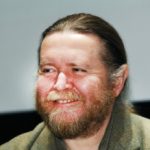 Andrzej Jagodziński (Secretary of the Jury)
Andrzej Jagodziński (Secretary of the Jury)
Born in 1954. Translator, journalist, editor. Graduate in Czech and Slovak Philology.
Translator of Hrabal, Skvorecki, Havel, Kundera, and more.
Journalist coworking with the Czechoslovakian section of Radio Free Europe, correspondent for Gazeta Wyborcza in Prague and Bratislava, director of the Polish Institute and cultural attaché of the Polish Embassy in Prague. Director of the International Visegrad Fund, director of the Visegrad Festival. mBank’s expert for expansion into Czech and Slovakian market. Editor-in-chief of “Literatura na Świecie.”
Recipient of the Distinguished Activist for Culture medal, Officer’s Cross of the Order of Polonia Restituta, The Medal for Merit to Culture – Gloria Artis.
When asked what makes a good translation, he answers: “A good translation is one that does not make me want to reach for the original, it’s smooth.” (dwutygodnik.com)


